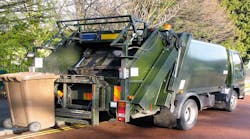The growing labor shortage across the waste and recycling industry has caused some hiccups for collection services in some areas of the country.
Take Houston, for instance, where the city’s fleet management department has been forced to pull nearly three dozen collection trucks off the road due to maintenance problems. Many of the fleet’s aging trucks — some 15 years old — are in need of repairs, but there aren’t enough technicians on hand to fix them.
And because of the nationwide truck driver shortage, since last November, when collection delays really picked up in Houston, city sanitation employees have clocked in around $948,000 in overtime pay.
In order to keep up with their regular collection schedules during this shortage, haulers will have to think outside the box when it comes to recruiting new employees and retaining the talent they already have. Though there is a general shortage of applicants within the labor pool, filling positions for commercial driver’s license (CDL) drivers and technicians present the greatest challenges for waste and recycling companies.
Ron Bergamini, chief executive officer of Action Environmental Services, which provides waste management services for New York’s five boroughs and northern New Jersey, explains that the more skilled the position, the harder it is to hire people.
“Finding people who are qualified is the biggest challenge,” he said. “New York poses a problem in that so much of the work, mainly with the drivers and helpers, is done at night. So, while there is a truck driver shortage all over the country, now it’s compounded with the fact that you have to work at night in tough conditions.”
In an effort to fill some of the holes in its workforce, Action employed the services of New York-based Center for Employment Opportunities (CEO) about 10 years ago. CEO works to provide people returning from prison immediate paid employment, skills training, and ongoing career support.
After overcoming the initial reluctance of hiring people who were formerly incarcerated, Bergamini says the company has had continued success with the program. Over the last decade, Action has hired around 140 to 150 people through CEO.
“We work with a few groups, but CEO was the one that rose to the top,” explained Bergamini. “We started out with a handful of people, and it worked as time went on. I define success as people who have stayed with us for a year or longer. Then, we got into a system where we would send some of our people over to CEO’s offices with the theory that the more people understood the job they were going to take, the more likely they would be successful. And it really developed from there. While I was the one pushing it in the company initially, soon lots of folks became champions of it because we did have that success.”
Moving forward, Action is also looking to pull the trigger on an apprentice program to train and onboard more technicians. However, Bergamini said he wishes he had more resources to train additional people, particularly since the job of a refuse truck technician has become more technical than ever.
Action has a refuse fleet of equipment ranging from brand new to 10 years old, and fixing those trucks is much different than it used to be. Technology has evolved to the point where the most important tool in a shop today is a laptop. Twenty or so years ago, haulers could hire self-taught mechanics who could come in and turn a wrench, but those days are coming to an end. “We have technicians who have been with us 20 years; it’s tougher to find the younger people,” said Bergamini. “That’s another thing you worry about because the workforce is aging. We have a handful of people who retire every year. It really could be more of a problem in five-plus years. It’s really finding the new people; that’s the trick.”
Right now, Bergamini said Action could hire around a half dozen technicians a week, and the company is always looking for qualified drivers.
Safety and the labor pool
Last December, the Bureau of Labor Statistics (BLS) published its annual review of fatal occupational injuries. BLS data shows that fatalities of all U.S. workers remained flat in 2017, and in the public and private waste and recycling industry, fatalities declined slightly from 31 in 2016 to 30 in 2017. However, the fatal work injury rate increased in 2017 from 34.1 to 35.0 per 100,000 full-time equivalent workers.
Despite the slight decrease in fatalities, the occupation of refuse and recyclable material collector remains the fifth most dangerous private sector job in the U.S. And statistics like that don’t help an industry in constant need of qualified workers.
To ramp up safety efforts for its operations, five years ago Florida-based Waste Pro hired Robert Bourcheau to join the company’s safety department. Right off the bat, Bourcheau noticed the company needed a formal safety program.
“We were having accidents, and they were caused by basically new CDL drivers who were somewhat transient and hired off the road,” explained Bourcheau. “They didn’t have formal training with garbage trucks, which are different than other over-the-road trucks.”
Bourcheau also noticed that Waste Pro’s helpers knew the collection routes, trucks,and company, but they didn’t have the proper license to operate the trucks.
“I felt why not get them in a position where they can get their license, and we would have experienced people driving our garbage trucks,” he said.
Bourcheau also thought company helpers would end up having a higher retention rate at the company and would be less inclined to jump ship for a competitor offering more money. So, in 2015, Bourcheau started the company’s Co-Heart program to help qualified helpers become CDL drivers.
“The talent that we were looking for was right here in our own family with our helpers,” he said. “All we had to do was put a little investment in them.”
To recruit talent outside of the company, Bourcheau visits area colleges that offer CDL programs. The company’s human resources department is also considering hiring former inmates to fill vacancies.
“Our one big payoff is the Co-Heart program and investing the time and money in those employees,” said Bourcheau, adding he developed the name of the program based on workers being the heart and soul of the company. “When people graduate from the program, it’s a bonding situation among the employee, the company, and myself. The most advantageous thing is that they are having fewer accidents, and they are staying with us longer.”




